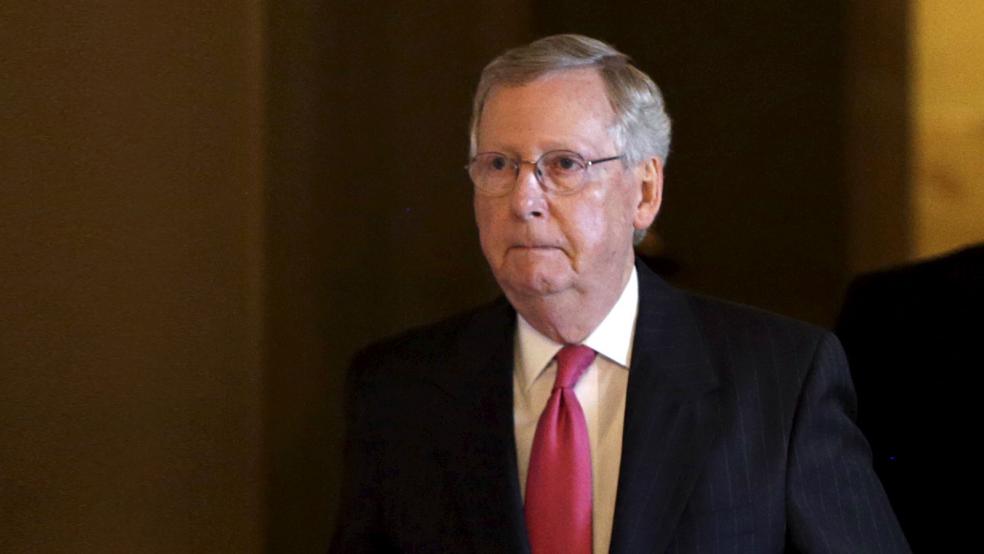In case anyone thought things couldn’t get more chaotic on Capitol Hill, Senate Majority Mitch McConnell appears ready to set them straight. McConnell, according to a report first published by CNN, plans to make several major demands of the White House, including changes to Medicare, Social Security, and EPA regulations as his price for raising the nation’s debt limit.
The report from CNN’s Manu Raju complicates the already fraught debate over whether and how to increase the Treasury Department’s ability to borrow the money it needs to pay the nation’s debts. Failure to allow additional borrowing would, at some point in early November, force the United States into default. U.S. government debt is viewed as the safest in the world – the closest thing there is to a risk-free asset. Allowing the government to default on its obligations would send shock waves throughout not just the U.S., but the global economy.
Related: The Debt Ceiling: What Is It And Why Should We Care?
As it is, the Treasury Department hit the debt ceiling months ago, and has been relying on extraordinary measures, like delaying payments into pension funds, in order to pay the government’s bills.
The changes McConnell is reportedly demanding are not minor tweaks to government programs. According to CNN, he wants to reduce the annual cost of living adjustment to the Social Security payments that millions of Americans rely on each month. He also wants to raise the eligibility age for Medicare and limit the benefits available to wealthy recipients. In addition, McConnell is looking to add policy riders to any debt limit legislation that would prevent the Environmental Protection Agency from enforcing some of its new Clean Water requirements.
Any one of these things would typically be subject to extensive debate in Congressional Committees and on the floor of both Houses of Congress. McConnell’s demands come just 23 days before November 5, the day the Treasury estimates that it will exhaust the extraordinary measures it has been using to keep the government running.
Even in the best of times, the U.S. Congress does not pass such complex legislation in the space of a few weeks, and these are not the best of times. The House of Representatives in in disarray, with Speaker John Boehner’s announcement of his intention to retire at the end of the month, largely due to pressure from the GOP’s far right wing.
Related: 8 Ideas for Saving Social Security Disability Insurance
Boehner’s would-be successor, Majority Leader Kevin McCarthy, was rejected by the same hardliners, and the man a large number of members want to see running the House, Ways and Means Committee Chairman Paul Ryan of Wisconsin, has said he doesn’t want the job.
In addition, a large contingent of the Republicans in both Houses of Congress want to use an upcoming showdown over a continuing resolution on government spending to force the White House to agree to defund the women’s healthcare and abortion provider Planned Parenthood.
Oh, and the White House is on the record saying that President Obama is not willing to negotiate over raising the debt limit, arguing that Congress itself passed the laws obligating the U.S. spend what is in the budget for this fiscal year, and that it is Congress’s responsibility to fully find those obligations.
So, what is McConnell thinking? Some analysts believe a combination of factors is in play, including McConnell’s own troubles with a restive right wing, and the sense that for the GOP, it’s now or never in terms of achieving some of its policy goals.
Related: Why Your Social Security Check Won’t Get Any Bigger Next Year
“Yes, a little bit of it is obviously the ghost of John Boehner,” said Republican strategist Ford O’Connell. However, he added, for the past nine months, Republicans have had their largest numerical advantage in Congress in generations, and so far have little to show for it.
“He has the largest number they’ve had since the 1930s,” said O’Connell. “If there was a time to do this it’s between now and 2016. The one thing Republicans don’t want to hear is wait until the next election. It’s a tired hymn.”
McConnell has promised that there will be no government shutdown this fall, and perhaps he believes he can get the continuing resolution passed in time to avoid a budget-related shutdown. But if he sticks to his guns and insists that the debt limit be tied to multiple controversial entitlement reforms rejected by the White House, there is a very real possibility that the federal government will have to curtail operations anyway – not because it doesn’t have the authority to spend money, but because it doesn’t have money in the first place.





